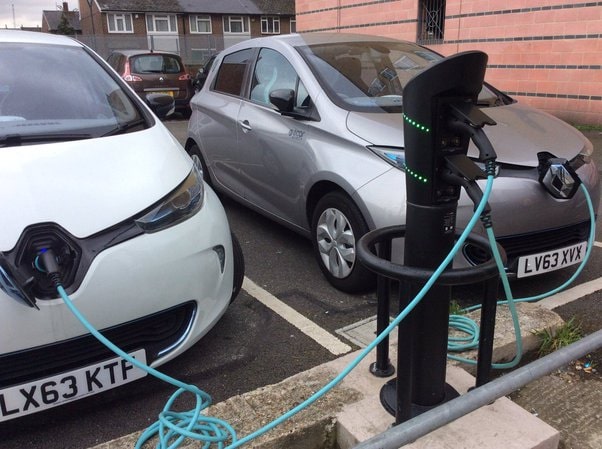The Growing Importance Of Electric Vehicles In Education
The growing importance of electric vehicles (EVs) in education has become a prominent trend lately, proving them to be a superior option to fossil fuel-powered cars. Educational institutions acknowledge the importance of incorporating sustainable practices into their curriculum, and EVs have emerged as a prominent subject of study. Students are encouraged to explore electric vehicles’ technology, environmental impact, and benefits. Moreover, educational organizations’ adoption of EVs for transportation promotes a greener and more eco-friendly campus. This emphasis on EVs in education aims to equip the next generation with the knowledge and skills required to address the global challenge of transitioning to sustainable transportation solutions.
Numerous Benefits Of EV Charging Solutions
By implementing EV charging station infrastructure in parking spots, educational institutions and service providers contribute to environmental sustainability. Encouraging the use of electric vehicles reduces air pollution and lowers the carbon footprint, fostering a greener campus and enhanced user experience for students and staff.
Adopting EV charging solutions can get financial incentives and lead to significant cost savings for educational institutions. With lower operational expenses than traditional fuel-powered vehicles, EVs can reduce maintenance and fuel costs, contributing to long-term financial benefits.
Integrating EV charging systems into the curriculum opens up new educational opportunities. Students can delve into the technology behind electric vehicles, understand their mechanics, and explore the principles of sustainable energy, enhancing their overall learning experience.
Embracing EV charging solutions in education brings environmental benefits and offers financial savings and enriching educational experiences for the next generation.
The Understanding Of Electric Vehicle Charging Solutions
As schools embrace sustainability goals, understanding EV charging solutions becomes vital. Campuses can opt for Level 1 charging, providing slow but convenient charging using standard household outlets. For faster charging, Level 2 stations requiring dedicated electrical circuits are ideal. Additionally, Level 3 DC fast chargers(fastest level)are perfect for quick top-ups on busy days. Strategically combining these options caters to the diverse needs of students, faculty, and visitors, promoting the widespread adoption of electric vehicles and contributing to a greener future within the academic community. Schools can ensure convenient access to eco-friendly transportation options with on-site charging stations and mobile charging solutions.
Implementing EV Charging Service In Schools: Key Considerations
Assessing Electrical Infrastructure: Schools must assess their electrical infrastructure’s capacity to handle additional power demand before installing EV charging stations. Upgrading electrical systems and reliable power supply is crucial to support the charging stations effectively. Great public charging service will provide a seamless charging experience.
Estimating Charging Demand and Planning for Growth: Estimating the charging demand based on the number of electric vehicles and their usage patterns is essential for determining the required number of charging stations. Planning for future growth in EV adoption will help avoid potential charging shortages.
Evaluating Location and Installation Requirements: Selecting suitable locations for charging stations within the school premises is vital. Stations should be easily accessible to educated users while considering parking logistics and charging station specifications during installation.
Financial Aspects and Incentives: Schools need to consider the operational costs and maintenance costs comprehensively of the charging station and plan the cost reasonably to ensure the sustainable operation and service quality of the charging station. Exploring available incentives, grants, or partnerships can help cost savings.
Addressing Safety and Liability Concerns: Safety protocols and liability considerations must establish to ensure the secure operation of charging stations and mitigate potential risks or accidents. Simultaneously, management policies and administration policies will help improve user acceptance and experience with electric vehicles.
By carefully considering these key factors, schools can successfully implement EV charging solutions and contribute to a sustainable, eco-friendly campus environment.
Case Studies
One exemplary case of EV charging in education comes from Greenfield University, one of the progressive
larger organizations committed to sustainability. Recognizing the importance of reducing carbon emissions and promoting clean, renewable energy, the university collaborated with a leading EV charging solutions provider to implement charging stations on campus. The strategically placed charging points cater to students and staff, encouraging the adoption of electric vehicles.
Final Thoughts On The Sustainable Future
As electric vehicles (EVs) continue to revolutionize the automotive industry, their role in education is set to grow significantly in the sustainable transportation future. The integration of EVs within educational institutions not only promotes environmental consciousness but also offers valuable learning opportunities for students. As technology advances and charging infrastructure expands, schools will have even greater potential to embrace EVs as part of their sustainable transportation solutions. Moreover, the knowledge gained through studying and implementing EV charging solutions will empower students to become advocates for cleaner, greener mobility options in their communities and beyond. With a collective commitment to sustainability, the future of EVs in education holds the promise of a cleaner, more eco-conscious world.
Post time: Nov-09-2023

 Portable EV Charger
Portable EV Charger Home EV Wallbox
Home EV Wallbox DC Charger Station
DC Charger Station EV Charging Module
EV Charging Module NACS&CCS1&CCS2
NACS&CCS1&CCS2 EV Accessories
EV Accessories

